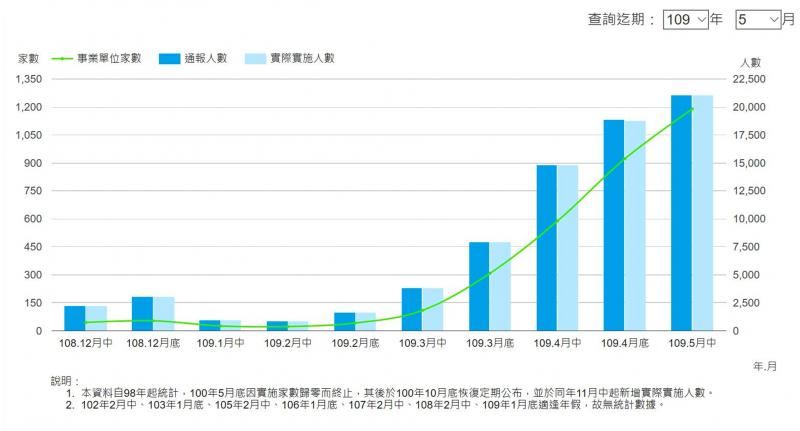Companies have placed more than 22,000 workers on unpaid leave nationwide as of Friday, including more than 10,000 in the manufacturing sector, as the COVID-19 pandemic continues to affect the domestic and global economy, the Ministry of Labor said yesterday.
A total of 1,285 companies have implemented unpaid leave programs in cooperation with their employees, up from 1,189 on May 18, ministry data showed.
The total number of workers on furlough at those companies as of Friday was 22,500, compared with 21,067 four days earlier, the data showed.

Photo: screen shot from the Ministry of Labor Web site
In the export-oriented manufacturing sector, the number of workers on unpaid leave rose by 1,383 over the four-day period, to 10,169, the highest figure among the nation’s major industries, the ministry said.
Within the sector, the metal and electrical industry furloughed more than 800 workers over the period, as orders from foreign customers continued to fall sharply due to the pandemic, Department of Labor Standards and Equal Employment Director-General Hsieh Chien-chien (謝倩蒨) told reporters.
Other industries with high furlough numbers as of Friday were the wholesale and retail sector (3,839 workers), and the hospitality and food and beverage industry (3,569 workers), the ministry said.
However, the number of workers on unpaid leave in the hospitality and food and beverage industry declined by about 400 from May 18, as the government lifted some coronavirus restrictions and implemented relief measures.
Among the companies with employees on furlough, the wholesale and retail sector had the highest number at 386, followed by the manufacturing sector at 283, and the hospitality and food and beverage industry at 157, it said.
The number of workers on unpaid leave nationwide has reached the highest since November 2009, during the global financial crisis, Hsieh said.
Furlough programs typically last less than three months, with employees taking five to eight days of unpaid leave per month, the ministry said.
Most of the companies implementing unpaid leave are small enterprises with fewer than 50 workers, it added.

Taiwan has received more than US$70 million in royalties as of the end of last year from developing the F-16V jet as countries worldwide purchase or upgrade to this popular model, government and military officials said on Saturday. Taiwan funded the development of the F-16V jet and ended up the sole investor as other countries withdrew from the program. Now the F-16V is increasingly popular and countries must pay Taiwan a percentage in royalties when they purchase new F-16V aircraft or upgrade older F-16 models. The next five years are expected to be the peak for these royalties, with Taiwan potentially earning

STAY IN YOUR LANE: As the US and Israel attack Iran, the ministry has warned China not to overstep by including Taiwanese citizens in its evacuation orders The Ministry of Foreign Affairs (MOFA) yesterday rebuked a statement by China’s embassy in Israel that it would evacuate Taiwanese holders of Chinese travel documents from Israel amid the latter’s escalating conflict with Iran. Tensions have risen across the Middle East in the wake of US and Israeli airstrikes on Iran beginning Saturday. China subsequently issued an evacuation notice for its citizens. In a news release, the Chinese embassy in Israel said holders of “Taiwan compatriot permits (台胞證)” issued to Taiwanese nationals by Chinese authorities for travel to China — could register for evacuation to Egypt. In Taipei, the ministry yesterday said Taiwan

‘LIKE-MINDED PARTNER’: Tako van Popta said it would be inappropriate to delay signing the deal with Taiwan because of China, adding he would promote the issue Canadian senators have stressed Taiwan’s importance for international trade and expressed enthusiasm for ensuring the Taiwan-Canada trade cooperation framework agreement is implemented this year. Representative to Canada Harry Tseng (曾厚仁) in an interview with the Central News Agency (CNA) said he was increasingly uneasy about Ottawa’s delays in signing the agreement, especially as Ottawa has warmed toward Beijing. There are “no negotiations left. Not only [is it] initialed, we have three versions of the text ready: English, French and Mandarin,” Tseng said. “That tells you how close we are to the final signature.” Tseng said that he hoped Canadian Prime Minister Mark Carney

Taiwan is awaiting official notification from the US regarding the status of the Agreement on Reciprocal Trade (ART) after the US Supreme Court ruled US President Donald Trump's global tariffs unconstitutional. Speaking to reporters before a legislative hearing today, Premier Cho Jung-tai (卓榮泰) said that Taiwan's negotiation team remains focused on ensuring that the bilateral trade deal remains intact despite the legal challenge to Trump's tariff policy. "The US has pledged to notify its trade partners once the subsequent administrative and legal processes are finalized, and that certainly includes Taiwan," Cho said when asked about opposition parties’ doubts that the ART was